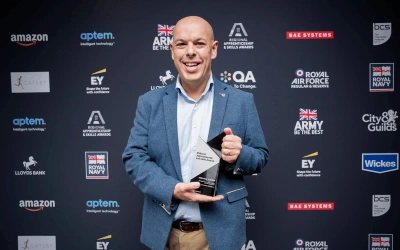Gender equality matters. It’s not a question, or an opinion, it’s a fact. Gender diverse companies have been proven to outperform non-gender diverse companies on multiple levels, from return on invested capital to better operating results, innovation or reduced risk of financial collapse. And if we take into account racial and ethnic diversity, the potential increase to business performance is even greater. At the same time, there is a clear link between diversity practices in the workplace and employee engagement, especially building trust. A business that takes concentrated efforts to balance diversity and be culturally inclusive benefits from a happier, more engaged workforce; something which is in many ways more valuable than commercial or operational success. Breaking down barriers, confronting stereotypes and ensuring equal and fair representation will also help us to reflect the society that we aspire to live in; that’s no insignificant goal. From a business perspective, therefore, the importance of gender diversity is undeniable – the statistics speak for themselves. From a moral perspective, gender diversity is non-negotiable – it’s the right thing to do.
And yet, the workforce remains imbalanced. We’re inundated with statistics that clearly state the value of diversity, while being flooded with statistics showing that we’re barely mobile. In the UK, only 20 percent of board seats are held by women, a stark contrast to Norway’s 42 percent. Women are shown to be disadvantaged at every level and from the outset; they’re less likely to be hired at entry level (despite being more qualified), 18 percent less likely to be promoted and only one in five women (less than one in 30 for women of colour) make it to C-suite level. Less women at board-level also means less likelihood of a female CEO (or is the other way around?) with a study by Deloitte showing that 29 percent of board positions are held by women in companies with a female CEO, compared to 15 percent for companies with a male CEO.
All of this bottoms out at one of the greatest imbalances the workforce faces: the gender pay gap, which still sits at 9.1 percent in the UK, despite nationwide initiatives to tackle the shortfall. In the name of transparency, we know that even at Lorien and onezeero. we face challenges with this – something which we will be reporting on and taking direct action on in the coming weeks. There is a disjoint in the talent pipeline and it is being felt in almost every organisation, at every level, in every industry. This is no different in recruitment.
This year, Lorien and onezeero. wanted to look at the recruitment sector from the perspective of our people and the wider market. What makes our women successful? Do women consider recruitment an attractive career, and what drives them? On the other hand, is there anything that puts women off, that worries them or concerns them about the industry? What’s our reality and what can we offer to provide a rewarding, fulfilling and long-term career at the top of the tech recruitment industry? That’s where we’ll begin – with our own beliefs and perceptions. As for where we’ll end, that answer lies with our people. It’s only by listening to them that we’ll get the answers we need to evoke change.
Cultivating Career Equality is Lorien and onezeero.’s initiative to address diversity and the balance in the workplace, one step at a time. We spoke to the creators of Cultivating Career Equality – CEO of Lorien Claire Marsh and managing director of onezeero. Matt Holmes – to see why they decided to focus on gender diversity for their first initiative.
Claire says:
As someone who’s worked in recruitment for twenty years (all at Lorien – I joined as a resourcer!), and been lucky enough to work in an organisation that really drives career progression, I’ve often wondered where recruitment’s reputation for being hyper-masculine came from. I’ve also always wondered why an industry that is so orientated around people – and manages to have a fairly even gender split at entry level in some sectors – eventually becomes so unbalanced in later years. I believe there’s a chance the two may be connected, and that’s one thing we wanted to explore over the coming weeks. Where did this stereotype come from? Is it even true, and do companies feel like they need to live up to it? Does it stop women getting into the field and does it stop them progressing? Do we even need a competitive environment to build a successful business?
The gender balance is a problem worldwide, as a recruitment business working in the technology sector – where women make up only a stark 21 percent of executives in tech - we are often tasked with supporting our clients to overcome their own gender imbalances. It’s become an agenda (and one I fully advocate) for everyone.
As a forward thinking business I strongly believe that we must deliver for the next generation. That means creating equal opportunities, driving career progression and ensuring a supportive, collaborative working environment that will cultivate fulfilling careers for everyone. I believe that even though we’re already doing a lot, we could always be doing more. Change is on the horizon and I want Lorien and onezeero. to be at the forefront of that change. That’s why we’ve launched ‘Cultivating Career Equality’ – it’s the first step towards analysing our workforce and approach to diversity. Our hope is to identify the positive actions we can take towards improving our own gender balance and how to continue to create a diverse and progressive working culture. We’ll also aim to uncover the myths in recruitment and examine how the industry as a whole can offer a fulfilling, long-term career for anyone and everyone – but only if it leads with diversity.
Matt says:
About 12 months ago I was sat at the Institute of Recruitment Professionals awards watching Julia Robertson – Group CEO of the Impellam Group – accepting her award for lifetime achievement. It was at this point my decision was solidified, that for all the pride I felt for being self-taught (and, at times, frustration), there was still a lot I could learn. In order to really challenge myself, I needed to be around leaders who knew the industry-inside out. Not long after this I was introduced to Claire. Claire joined Lorien as a resourcer, progressing in the space of 20 years to become the CEO in 2016. She’s one of Lorien’s success stories – a home grown talent that is now carving the future strategy of the business. After a few conversations with Claire, joining the Impellam family felt like the correct balance between supporting creativity and autonomy whilst being part of a much larger organisation. That was how I found myself six months after the awards, sat in Julia’s office discussing the role of managing director at onezeero. – trophy proudly on display behind her.
I’ve been managing director at onezeero. for just over five months now and I already feel like I’ve learnt so much, with access to the whole Impellam senior leadership and our very own onezeero./Lorien leadership team . The key lesson that I’ve taken away from my experience though is the importance of mentorship and inspiring leaders to push through the boundaries. I genuinely believe that this is one of the strongest ways that we can not only encourage more women to get into the recruitment sector – by championing female success stories – but importantly by retaining them. At onezeero., Lorien and Impellam, we have women leading our functional departments in legal, finance, marketing, talent, HR and digital, as well as some of our business units and brands. Representation at this level, and mentorship from the top down, is critical for engagement. I don’t think this has to be exclusive to women, either. Julia and Claire are inspiring me, and I hope that one day I’ll be in their positions inspiring and championing our future senior leaders. For now the focus is on applying the same principles to onezeero. and our people’s career development. For me therefore, this campaign is also about celebrating what we’re doing well as well as looking at what more we can be doing for our people. That starts by reflecting not only on our beliefs about the sector, but also by listening to what they have to say. It could tip all of our pre-suppositions about the industry, the gender balance and what we think we should be doing to achieve our mission, on their head.
Want to find out more about Cultivating Career Equality? Hear all about our journey here.







